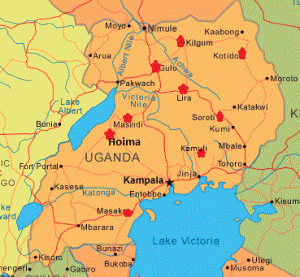Living with Shalom Celebration
 Back in March we had a short blog about one of our partners—Living with shalom—based in Hoima. Every January groups of youth from various parts of Uganda are brought together for 3 weeks of learning what it means to “live with shalom” within themselves, with others, and with God. There are six young people from nine different areas of the country—Masaka, Hoima, Masindi, Kitgum, Gulu, Lira, Kotido, Soroti, and Kamuli. These represent different ethnic groups.
Back in March we had a short blog about one of our partners—Living with shalom—based in Hoima. Every January groups of youth from various parts of Uganda are brought together for 3 weeks of learning what it means to “live with shalom” within themselves, with others, and with God. There are six young people from nine different areas of the country—Masaka, Hoima, Masindi, Kitgum, Gulu, Lira, Kotido, Soroti, and Kamuli. These represent different ethnic groups.
They work at peace by breaking down stereotypes of others and learning how to deal with conflict. They work at peace with themselves through life skills and learning about HIV Aids. They work at peace with the environment through conservation, especially in the form of energy-efficient stoves and the planting of trees. They make three field trips during these weeks. This year they visited a resettlement area, an orphanage, and Murchison Falls National Park.
At the end of the three weeks they have a celebration which we attended. The day began with a parade, including a police escort and a small band, through the town of Hoima. During the parade they carry signs encouraging acceptance of those with HIV Aids, warning against deforestation, and asking people not to litter. As they moved through town they picked up the trash. In the afternoon there were dances, songs, and skits by the various groups. (Dancers do not hold still; so yes, our photos are blurry!) There was one skit about accepting those who often are not accepted—prisoner, HIV victim, disabled and another skit about domestic violence. The day ended with the obligatory speeches!
During the day we had a chance to talk with some of the participants. One said that before these weeks, he didn’t know people from other parts of the country and was even suspicious or afraid of them. Now he has friends wherever he goes! The significance of this statement cannot be underestimated in a country where loyalty to clan or ethnic group tends to far exceed loyalty to the country.
This three-week training will be followed by reciprocal visits during the coming year by the groups of youth to each other’s home areas.


















